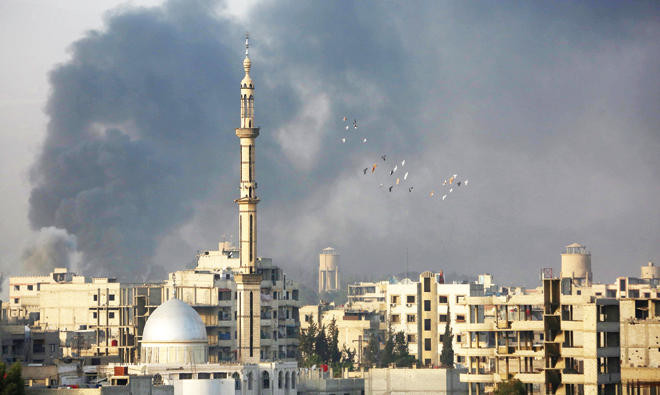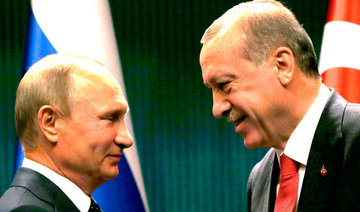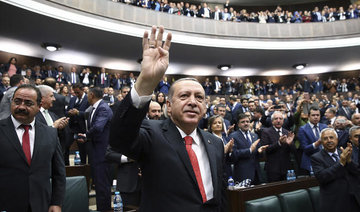ANKARA: Turkish President Recep Tayyip Erdogan and his Russian counterpart Vladimir Putin held a closed meeting on Tuesday for about four hours, with a focus on deepening their relations and the latest developments in Syria.
It was the sixth time the two leaders had met, and this year Erdogan visited Russia three times.
“Turkey and Russia agreed that grounds have emerged for political resolution in Syria,” Erdogan said during a joint press conference at the presidential residence in Russia’s Black Sea coastal city of Sochi.
Parallel to UN-backed negotiations in Geneva, Turkey, Russia and Iran are the guarantor countries of the Astana deal, and have begun implementing “de-escalation zones” and cease-fire monitoring missions in northern Syria.
During the press conference, Putin said the meetings with Turkey about the Syrian crisis had contributed to decreasing the level of violence.
But before departing for his meeting with Putin, Erdogan criticized a consensus between the Russian and US presidents that “no military solution is possible” in Syria.
“I’m having difficulty understanding these comments. If a military solution is out of the question, then those who say this should pull their troops out,” Erdogan said.
“If a military method isn’t a solution, one should apply to the political method and find ways to go to elections as soon as possible.”
At the end of the meeting, Putin and Erdogan agreed to focus on a political solution.
Nursin Atesoglu Guney, dean of the faculty of economics, administrative and social sciences at Bahcesehir Cyprus University, told Arab News: “During this meeting, both leaders showed a willingness to continue their… partnership in Syria.”
She said: “Russia would like to balance the US weight in the region... Ankara also wants to play a delicate balancing game regarding the big actors in the region, because Syria is currently at the epicenter of global fault lines.”
A point of contention between Moscow and Ankara is the participation of the Kurdish-led Democratic Union Party (PYD) in the Russia-sponsored Syrian Congress on National Dialogue.
No statement was made about it during the press conference, though Moscow recently denied Turkish claims that the Congress had been postponed.
Ankara strongly objects to inviting the PYD, and experts do not expect the issue to be resolved soon.
Moscow does not consider the PYD a terrorist group, and is trying to give it a diplomatic platform.
But Ankara sees it as an extension of the Kurdistan Workers’ Party (PKK), which is designated a terrorist organization by Turkey, the US and EU. Ankara vetoed the PYD’s participation in previous peace talks on Syria.
Emre Ersen, a Syria analyst at Marmara University in Istanbul, said although Moscow views Ankara as a very important regional actor in resolving the Syrian crisis, it believes the PYD and its military wing, the People’s Protection Units (YPG), can play a significant role in Syria’s political future.
“Considering the close political and military ties between the PYD/YPG and Washington, it’s important for Moscow to use its developing relations with the PYD/YPG as a potential card at its disposal vis-a-vis the US,” Ersen told Arab News.
Ankara has expressed concerns over military links between Russia and the PYD/YPG in the Afrin region of Syria, he said.
The main motive for Turkey in cooperating with Russia and Iran in the de-escalation zone in Idlib province is the expectation that this cooperation can be extended to Afrin, in which Ankara has stated its intention to launch a military operation against the PYD/YPG, he added.
“At the same time, however, Ankara and Tehran are closely watching Moscow’s dealings with Washington,” Ersen said.
“As indicated by the latest meeting between the Russian and US presidents, the agenda of the two global powers differs significantly from that of the regional powers,” he added.
“Since both Washington and Moscow enjoy close relations with the PYD/YPG, Ankara’s reservations on this issue can be ignored, which might be detrimental to Turkey’s interests in Syria.”
Turkey, Russia cooperate in Syria despite differences
Turkey, Russia cooperate in Syria despite differences

Iran foreign ministry affirms support for Syria’s sovereignty

- Assad fled Syria earlier this month as rebel forces led by the Sunni Islamist group Hayat Tahrir Al-Sham (HTS) entered the capital Damascus
Tehran: Iran affirmed its support for Syria’s sovereignty on Monday, and said the country should not become “a haven for terrorism” after the fall of president Bashar Assad, a longtime Tehran ally.
“Our principled position on Syria is very clear: preserving the sovereignty and integrity of Syria and for the people of Syria to decide on its future without destructive foreign interference,” foreign ministry spokesman Esmaeil Baqaei said in a weekly press briefing.
He added that the country should not “become a haven for terrorism,” saying such an outcome would have “repercussions” for countries in the region.
Assad fled Syria earlier this month as rebel forces led by the Sunni Islamist group Hayat Tahrir Al-Sham (HTS) entered the capital Damascus after a lightning offensive.
The takeover by HTS — proscribed as a terrorist organization by many governments including the United States — has sparked concern, though the group has in recent years sought to moderate its image.
Headed by Ahmed Al-Sharaa, Syria’s new leader and an ardent opponent of Iran, the group has spoken out against the Islamic republic’s influence in Syria under Assad.
Tehran helped prop up Assad during Syria’s long civil war, providing him with military advisers.
During Monday’s press briefing, Baqaei said Iran had “no direct contact” with Syria’s new rulers.
Sharaa has received a host of foreign delegations since coming to power.
He met on Sunday with Turkish foreign minister Hakan Fidan, and on Monday with Jordan’s top diplomat Ayman Safadi.
On Friday, the United States’ top diplomat for the Middle East Barbara Leaf held a meeting with Sharaa, later saying she expected Syria would completely end any role for Iran in its affairs.
A handful of European delegations have also visited in recent days.
Regional powerhouse Saudi Arabia, which has long supported Syria’s opposition, is expected to send a delegation soon, according to Syria’s ambassador in Riyadh.
Iran says ‘no direct contact’ with Syria rulers

- Foreign ministry spokesman: ‘We have no direct contact with the ruling authority in Syria’
TEHRAN: Iran said Monday it had “no direct contact” with Syria’s new rulers after the fall of president Bashar Assad, a longtime Tehran ally.
“We have no direct contact with the ruling authority in Syria,” foreign ministry spokesman Esmaeil Baqaei said at a weekly press briefing.
Jordan foreign minister holds talks with Syria’s new leader

- It was the first visit by a senior Jordanian official since Bashar Assad’s fall
AMMAN: Jordanian Foreign Minister Ayman Safadi met with Syria’s new leader Ahmed Al-Sharaa in Damascus on Monday, Amman said, the latest high-profile visit since Bashar Assad’s ouster.
Images distributed by the Jordanian foreign ministry showed Safadi and Sharaa shaking hands, without offering further details about their meeting.
A foreign ministry statement earlier said that Safadi would meet with the new Syrian leader as well as with “several Syrian officials.”
It was the first visit by a senior Jordanian official since Assad’s fall.
Jordan, which borders Syria to the south, hosted a summit earlier this month where top Arab, Turkish, EU and US diplomats called for an inclusive and peaceful transition after years of civil war.
Sharaa, whose Islamist group Hayat Tahrir Al-Sham (HTS) spearheaded the offensive that toppled Assad on December 8, has welcomed senior officials from a host of countries in the Middle East and beyond in recent days.
Jordanian government spokesman Mohamed Momani told reporters on Sunday that Amman “sides with the will of the brotherly Syrian people,” stressing the close ties between the two nations.
Momani said the kingdom would like to see security and stability restored in Syria, and supported “the unity of its territories.”
Stability in war-torn Syria was in Jordan’s interests, Momani said, and would “ensure security on its borders.”
Some Syrians who had fled the war since 2011 and sought refuge in Jordan have begun returning home, according to Jordanian authorities.
The interior ministry said Thursday that more than 7,000 Syrians had left, out of some 1.3 million refugees Amman says it has hosted.
According to the United Nations, 680,000 Syrian refugees were registered with it in Jordan.
Jordan in recent years has tightened border controls in a crackdown on drug and weapon smuggling along its 375-kilometer border with Syria.
One of the main drugs smuggled is the amphetamine-like stimulant captagon, for which there is huge demand in the oil-rich Gulf.
Israeli airstrikes on Gaza kill at least 20 people, Palestinian medics say

- Israel’s air and ground offensive has killed over 45,200 Palestinians, according to Gaza’s Health Ministry till date
Palestinian medics say Israeli airstrikes on the Gaza Strip have killed at least 20 people.
One of the strikes overnight and into Monday hit a tent camp in the Muwasi area, an Israel-declared humanitarian zone, killing eight people, including two children. That’s according to the Nasser Hospital in the southern city of Khan Younis, which received the bodies.
Hospital records show another six killed in a strike on people securing an aid convoy and another two killed in a strike on a car in Muwasi. One person was killed in a separate strike in the area.
The Al-Aqsa Martyrs Hospital in the central city of Deir Al-Balah said three bodies arrived after an airstrike on a school-turned-shelter in the built-up Nuseirat refugee camp.
The Israeli military says it only strikes militants, accusing them of hiding among civilians. It said late Sunday that it had targeted a Hamas militant in the humanitarian zone.
The war began when Hamas-led militants attacked southern Israel on Oct. 7, 2023, killing some 1,200 people, mostly civilians, and taking around 250 hostage. Around 100 captives are still inside Gaza, at least a third of whom are believed to be dead.
Israel’s air and ground offensive has killed over 45,200 Palestinians, according to Gaza’s Health Ministry. The ministry says women and children make up more than half the dead but does not distinguish between civilians and combatants in its tally. The military says it has killed over 17,000 militants, without providing evidence.

















